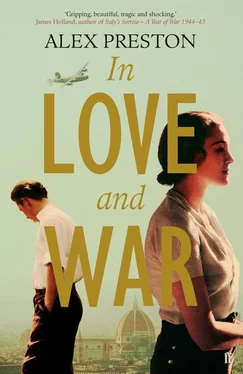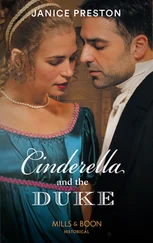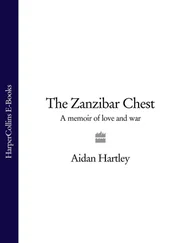[Various invitations to concerts associated with the Maggio Musicale: Beethoven at the Kunsthistorisches Institut, Tosca at the Teatro Verdi (sponsored by Piaggio), Bach at the British Institute, a string quartet hosted by Bernard Berenson at I Tatti.]
He sits in the grand drawing room at Berenson’s house, I Tatti, and tries to concentrate on the music. It is Haydn and the string quartet is very good, but he is thinking only of Anna. It was clear she was fighting at Christmas, desperate not to let him see her discomfort, and by the end of his visit was snatching gulps of breath, slinking off for rests in the early afternoon, pausing in the middle of their conversations to collect herself. He wonders if perhaps she might come out to Florence to join him. But war feels so close, so inevitable.
Ada is beside him. She’s wearing a dark green dress, long earrings with jade stones. Her pale arms grip the chair beneath her as she sways to the music. She hums so softly that only he can hear. When the movement finishes, she turns to him, clasps her hands to her chest and begins to applaud.
Welsh Frankton
Shropshire
26th April
Dear Esmond –
Anna is back home. It seems as if it was a false alarm, or that the treatment at the John Radcliffe worked. Sorry if my telegram alarmed you. She’s rather frail, but she’s being a good brave girl. Rudyard has been wheeling her around the garden in her bath chair — it’s bloody sweet, really.
Looks like another war is inevitable. I read a historian in The Spectator who has identified only twenty-nine years since the Roman Empire when a war wasn’t being fought somewhere in the world. We lurch from crisis to crisis and we learn nothing from history.
You asked in your letter what I could tell you about the last war, the first war, as I suppose we should learn to call it. About Hulme. I’m glad you’ve stuck on with your novel, sorry that Faber turned it down. (Perhaps we could set up a Fascist Press — not a bad idea!) Hulme was a brute, a gent, a genuine conservative. He was a bloody good friend and I was undone when he died. As for my war, it was a nightmare, but the worst part is that nothing since — not politics, not sex, not hunting, nothing — has lived up to it. The real horror, Esmond, is that I’m not still there, that life will never have the same sheen, quite the purpose it had in those days.
If you ever find yourself fighting, remember this one thing: anger is stronger than fear. It was only years after the war ended, when I stopped being angry, that I began to feel afraid. Remember that and you’ll make a fine soldier.
Give my regards to Goad.
Your mother sends her love,
Your father.
Tombland,
Norwich.
23rd May ’39.
Dear Esmond –
Sit tight! I’ll be back at the end of the week when we can put our heads together and try to work out what this all means. In the interim you should be in loco presbyter, helping the lame dogs over stiles. Remember: we’re not at war yet. Mussolini is a strong, fine leader and we’ll have to trust that this Pact of Steel he’s signed with Hitler is a piece of political theatre.
The funeral was as funerals are: dispiriting to see the reduction of a fine life into so many platitudes. I read ‘This I know: that my avenger lives’ from the Book of Job. Stood a few hairs on end. Sad to say goodbye to mother, but all flesh, etc.
If anything comes up, ask Goad.
Best of British,
Bailey.
He is lying back in the pool at L’Ombrellino, looking up through the leaves of the camphor tree. He’d come up to check on the place for George and Alice Keppel, but the walk up the hill was so tiring, the abandoned rooms of the villa so stuffy and smothering, that he’d run past the box hedges of the upper terrace, down the steps and between the two dodos before he could think, shedding his clothes along the path as he went.
If he can just stretch his arm out a little further, he thinks, he’ll be able to grab hold of Gerald’s ankle, touch one of Fiamma’s slim limbs. He wonders if the water holds some trace of them: fragments of Fiamma’s skin, microscopic, etherised. He takes a mouthful of water and spits it out in a green arc. There is also the present: the water murky with weed, slightly malodorous but still deliciously cool. Cypress cones float about him like miniature wooden roses. They look like love. He is in love. Hopeless, unrequited love. He grins. There’s something unseemly in it, with the coming war, with Anna’s illness, it feels improper to be lying back here in the water smiling like a child, but he is in love.
She is not beautiful; she is older than him and in his company she is distant and professional. She has given him no sign that she views him as anything other than an employer, a Fascist; certainly not a friend, never a lover. She doesn’t know that he’s been lying to the increasingly officious Interior Ministry functionaries about her, using his friendship with Pavolini, his letter from Mussolini to make sure she remains unmolested. There are rumours that the Jews will be made to wear yellow stars, to live in a ghetto up above Rifredi. There are camps being built in the south, so the whispers say, trains heading north from stations in the Friuli, rounding up Jews who’ve fled from Germany, from Austria, sending them back where they came from. He will keep her from all of this.
During the broadcasts, he watches her when she’s not looking. — Ada , he whispers above the sound of the crickets — Ada . He’s spent his life turning over stones, looking in rockpools, for someone like her. She has been in front of him for more than a year. There is something upright and idealistic and whole to her that makes him want to lay his hands upon her, to build a shell around her with his arms. He lies back in the water of the swimming pool as the air begins to darken above him and the wind stirs the fingers of the pines. In the hesitant evening he basks in the gorgeous restlessness of his love for her. — Ada .
De Koning van Spanje,
Korte Nieuwstraat 12,
Antwerp.
19th June.
Dear Esmond,
We write with bad news. Philip was killed in Spain on the 23rd of December last year. We have been moving around a great deal and have only just had the information ourselves. Amongst his affairs there were several of your letters and instructions to let you know in the event of anything happening to him. I’m aware that you two were terribly close at Cambridge and I’m sorry to bear news that must come as a shock.
We had a letter from General Walter, the leader of the XIV International Brigade under which Philip served for much of his time in Spain. It appears the death was somewhat heroic. He held a machine-gun emplacement in Les Borges Blanques for six hours, single-handed, as the Falangists swarmed over the area. He was on a small hill in the centre of a grove of olives and, when he was finally overwhelmed, he turned his gun upon himself rather than be captured. A great soldier, General Walter told us, fearless and loyal.
We blame ourselves for Philip being in Spain. We had arranged to meet him in Lisbon, but I wanted to leave Europe as soon as possible. I got us a berth on a ship bound for Rio de Janeiro that struck rocks off the Azores. We spent several months attempting to get safe passage onwards from Ponta Delgada, but finally we were returned to Lisbon. With almost the last of the money we carried with us from Austria, we procured a cabin on the MS St Louis, a German ship, to Cuba. We were denied landing in Havana, then in Florida, where we might have swum ashore, so close were we to the beaches. Now we are back in Antwerp, penniless and without hope, to find that our only son is dead. Life can be cruel.
Thank you for the friendship you showed to Philip. We hope that, whatever dark days lie ahead, you continue to flourish.
Читать дальше












